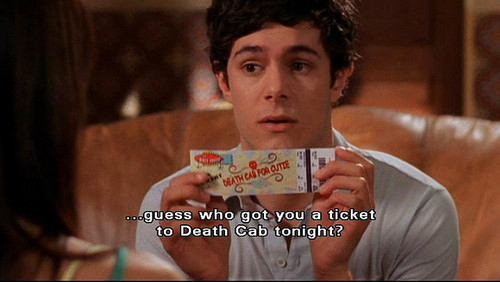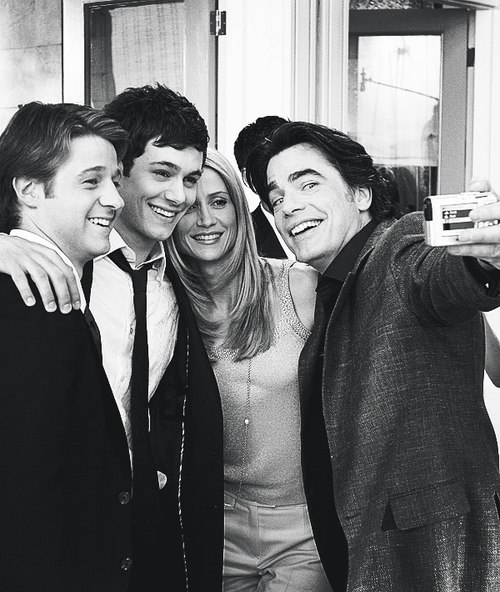
"Welcome to the O.C., bitch!!!!" was the punch to the face that jolted Ryan Atwood (Ben McKenzie) into the realization that, yes, he wasn't in his hometown of Chino anymore, but he was in a whole other world—an alternate dimension where the kids looked, dressed, and talked like adults (well-off ones at that), but still behaved like they were in high school.
It was a tip of the hat to what would be the show's streak of meta-infused plot lines and ancillary details. For Ryan, being invited to live in the pool house of the well-to-do but still impossibly cool Cohens and their nerdy, indie music savant of a teenage son in their ritzy Southern California home was like being plopped into a TV show (The characters on The O.C. always felt like they learned how to be people by watching people on TV.)
Shaped in the mold of Aaron Spelling and John Hughes dramedies and sporting the attitudes of WB torchbearers like Felicity and Buffy the Vampire Slayer, the four main teens of the show and their interwoven, histrionic, and lyrical comings-of-age can now be seen as among the first representations of Millennials' special crises and crosses they bare. The O.C. was the show the characters in Girls probably all watched in high school (even Jessa).
The O.C. is significant to the canon because of the lasting impression it left on television and the people who watched and eventually went on to make it. It wasn't just me and my dad who watched and loved and were occasionally inspired by it (me and every other twentysomething are still listening to Seth Cohen Rock—Spotify's rise hasn't helped). In more ways than Death Cab for Cutie, The O.C. exists as the antecedent to many a modern element in the so-called Golden Age of Television.

Setting montages of the cast—having fun at the beach, taking senior class photos, whatever—to music was The O.C.'s bread and butter. (How the show fashioned itself into an outpost for soundtrack and iTunes sales and helping garner the attention needed for just-under-the-radar bands to break out big is worthy of its own story.) It was lazy storytelling, a sort of emotional or thematic shorthand that more often played like moody music videos than genuine plot. They usually accomplished nothing more than making you wonder what song they used in that primitive, pre-Shazam (and pre-iPhone) era. And you saw it everywhere on TV at the time: Scrubs (though it did premiere before O.C., I argue that the latter took it mainstream), Rescue Me, and its worst offender, Grey's Anatomy. By the time Josh Schwartz's follow-up show, Gossip Girl, premiered in 2007, setting long scenes to music was a foregone conclusion.

But as much that gets made about how the show used and understood music, it also set itself up as a show with an acute awareness of what would inspire drama in the lives of the teens it depicted. Sure, Ryan, Marissa (Mischa Barton), Seth (Adam Brody), and Summer (Rachel Bilson) all went to private school with a lounge that had arcade games and looked cooler than most of the first bars I ever snuck into, but their problems were prototypically Millennial, all induced by a generation's intense anxiety to achieve.
Harry Potter had already re-hardwired kids to cherish learning, respect the wisdom of their elders, and most importantly, take school and what comes after it very seriously. The O.C. took that and spun out a tale of yuppie, affluent aspiration that put serious stock in the educational decisions made by its teenage characters. But it was about so much more than good grades, though the show did its part to make being a good student look cool—when Marissa Cooper said she had a 4.0, you didn't flinch and you were also envious.
Rather, it was what those high GPAs and test scores meant: great, name-brand colleges that would set you up to make your mark in the world. A huge plot point in the Seth-Summer relationship was when Summer got into Brown and Seth didn't. The show followed through and added to the tension by telescoping an (admittedly overwrought) reality that comes from not going to a good school: Seth became adrift, breaking up with Summer and accidentally burning down his family's business smoking a joint. Summer, meanwhile, found her environmental spirit at Brown and we later learn that Ryan became a successful architect after attending UC Berkeley.
Though this is not to say the show was a model of ideal behavior (it was a soap after all). The kids made plenty of teenage mistakes, including ill-conceived trips to Mexico, trying on lesbian identities with Olivia Wilde, taking up cage fighting, and getting killed by volatile ex-boyfriends. (R.I.P. Marissa Cooper.)

Most importantly, though, the show laid the groundwork for a reimagined dynamic between kids, parents, and how they talked and engaged with each other. Kirsten and Sandy Cohen (Kelly Rowan and Peter Gallagher) were far from perfect parents or people—Sandy came thisclose to cheating on Kirsten, who herself had a drinking problem. Her intervention was one of the show's more poignant moments because of how it emotionally emphasized her kids as the turning point to enter treatment.
But Sandy and Kirsten Cohen can be seen as the proto-Eric and Tami Taylor from Friday Night Lights, their relationship marked by tough love, playful ribbing, and an unwavering moral standard that they try their best to instill in their kids: to always try and do the right thing.
Talking to and befriending your parents, even when they themselves were your problem, became not only a viable course of action, but seemed cool, fun, and way less stressful. And the show rendered the interplay of the Cohens in stark contrast to Marissa and Summer's families, who were distant (or sometimes altogether absent), misbehaved, and out-of-touch. (They they weren't completely beyond reproach: Marissa's formerly devious mom Julie ended up being a softie that married Kevin Sorbo.)
We've seen different incarnations of Sandy and Kirsten in the decade following The O.C. We saw it in the tender mother-daughter love between Rory and Lorelai Gilmore, with Keith Mars and his teenage sleuth of a daughter, Veronica. We see it in now in Awkward, MTV's under-praised teen drama about a girl who is mistaken as suicidal. And on ABC Family's on-the-bubble ballerina show, Bunheads, Sutton Foster plays what is essentially Kirsten Cohen's, Lorelai Gilmore's, and Tami Taylor's ultimate soul sister. And we see it on Switched at Birth and now this summer, The Fosters and Camp. And probably countless other shows I'm completely forgetting about.
The O.C. turns 10 August 5. My suggestion, to be completely dismissed by your own needs, pleasures, and time: Snatch up the DVDS, and on the day, pop a disc in, press play, let Phantom Planet's "California" ring out through your flatscreen, and marvel at just how much you love about TV now you see in this show.



